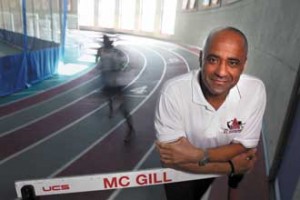
Former sprint star nearing quarter century of service
By Neale McDevitt
Dennis Barrett has a pet peeve. “Most of the athletes I work with are great,” said McGill’s longtime track and field coach. “But every now and then I get one of those kids with a real sense of entitlement who’s been babied by their parents. They come here and expect the same treatment from me, expect me to tell them how wonderful they are.
“Sometimes I have to be the one to say, ‘You know what? You’re not that wonderful. You still have work to do.’ ”
Doubling up as the strength and conditioning coordinator for varsity teams, the native of Kingston, Jamaica, understands a thing or two about putting in the grinding, inglorious hours in the gym long before the adrenaline rush of competition kicks in. “If you want to be successful there is always a price to pay,” he said.
And Barrett is no stranger to success. Transferring to McGill as an MA student in exercise physiology in 1981, the versatile young runner was named the captain of the track and field team, earning MVP honours while becoming the University’s first All-Canadian track athlete. He ran events such as the 800 metres and the 400m hurdles, and was a member of the 4x200m relay team that set a school record of 1:27.92 that still stands today more than 25 years later. “Some people joke that I’m not trying too hard to recruit the athletes to break that record,” Barrett said with a laugh on the phone from Windsor, Ont., where he was coaching 18 McGill athletes at the national championships. “But every year, I offer to pay for a nice dinner for the guys who break it.”
In 1984, he took the helm of the track program and since then he’s been named Quebec university conference Coach of the Year 20 times. Similarly, in the 20 years Barrett has been running McGill’s cross-country team, he has been named the conference’s Coach of the Year 29 times (total for the men’s and women’s teams).
Need more numbers? In track, Barrett has helped McGill win 14 Quebec women’s championships and six men’s titles. In cross-country, Barrett-lead teams have earned 10 men’s titles and 19-straight women’s banners – an astounding dynasty that ended only this year. Along the way, he has coached 42 All-Canadians in track and 19 more in cross-country.
At 24 years of service and counting, the indefatigable Barrett is tied with swim coach François Laurin as the University’s longest-standing coach. He says that there is no secret to maintaining his enthusiasm after all these years: surround yourself with good people and produce athletes who are, in his own words, “in the mix.”
“When you have good assistant coaches, you really look forward to working with them and going on trips,” he said. “They help rejuvenate me.
“I also feed off of the athletes’ enthusiasm,” he said. “When they are in the hunt [for medals] at a meet, it energizes me – that’s what makes me tick. I still get nervous at competitions, especially when we have athletes on the cusp of doing very well.”
And now for something completely different
On the surface, Barrett’s career seems like a testament to consistency and to staying the course. And it is – with the exception of one interesting, and somewhat icy, detour.
Following his first year as track coach at McGill in 1984, Barrett agreed to help a local bobsledding hopeful prepare for the upcoming World Cup circuit. (Over the years, Barrett has worked as strength and conditioning coach for pro hockey, football and tennis players, as well as Olympic athletes, including pairs figure-skating gold medalists Jamie Salé and David Pelletier.)
But when Barrett beat the powerful sledder in a 30m sprint – twice – he was asked to tryout for the team. Taking a year’s hiatus from McGill and the track, Barrett transformed his body from that of a lanky 157-pound runner to well-muscled 183-pound bobsledder and competed on the World Cup circuit for Canada.
The season itself was a blur – literally – with the rookie sledder experiencing firsthand the unique thrill of rocketing down straightaways in an open sled at well over 100km an hour. “Luckily, we never crashed,” he said. “You can get some serious ice burns going that fast.”
Although he was on track for the 1988 Winter Games in Calgary, Barrett hung up his lycra suit at the end of the season. “I had student loans and I wasn’t going to mortgage myself for a sport, so I walked away,” he said. “No regrets.”
Instead, Barrett returned to McGill in 1986 to pick up the baton and start his second year as the track coach. Let’s see how far I can run with this, he thought to himself. Almost a quarter century later, the former sprinter shows no signs of slowing down.
